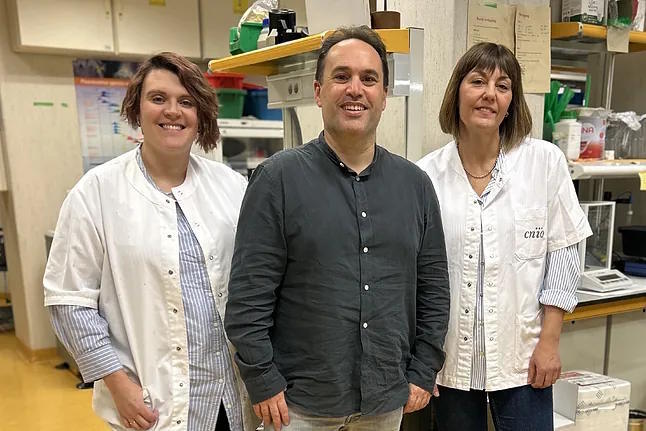A team led by the Spanish National Cancer Research Centre (CNIO) has shown in mice that a high-fat diet increases metastasis of triple-negative breast cancer, which has the worst prognosis. Additionally, they have identified several mechanisms that could explain this, such as platelet and coagulation activation, allowing the tumor to evade the immune system and prepare the so-called premetastatic niche.
This type of tumor represents approximately 15% of breast cancer diagnoses. Its negative prognosis is as poor as that of lung or stomach cancer. Half of the patients have a survival of more than seven months, and the other half less than that time. The Spanish Society for the Study of Obesity (SEEDO) points out that 48.4% of women in our country are overweight and 18% are obese.
Obesity is associated with a higher risk of developing breast cancer and a greater propensity for cancer to spread to other organs (metastasize). However, the reasons for this association are not yet well understood. This research now provides new data by discovering that a high-fat diet activates mechanisms that facilitate metastasis.
This is a study led by Héctor Peinado, head of the Microenvironment and Metastasis Group at CNIO. The authors state that "this mechanism could be extrapolated to other tumor types and organs." The results suggest that "dietary intervention, along with platelet activity control, can enhance the efficiency of certain antitumor treatments."
For cancer to spread to other organs, many tumor cells need to leave the primary tumor, travel through the bloodstream, settle, and proliferate in another organ. Sometimes, the primary tumor sends molecules that modify the destination organ beforehand, preparing a nest that hosts the tumor cells: the so-called premetastatic niche, where the tumor cell can take root and develop metastases.
The CNIO group shows in their new work that in obese mice fed a high-fat diet, changes occur that facilitate the creation of the premetastatic niche, in this case in the lungs. Specifically, platelet activation and blood coagulation capacity increase; additionally, fibronectin, the protein that connects lung tissue cells, is activated.
How they build a shield for tumor cells
Obesity promotes blood coagulation, a process dependent on blood cells called platelets. Indeed, as observed by CNIO researcher and first author of the study Marta Hergueta, in animals fed a high-fat diet, the cells that detach from the primary tumor are surrounded by more platelets during their journey through the blood than in mice on a normal diet.
One hypothesis is that platelets could be hindering the immune system's detection of cancer cells: platelets would form "a shield around tumor cells, preventing the immune system from recognizing and eliminating them," explains Peinado.
In addition to influencing platelets, the CNIO group found that a high-fat diet increases fibronectin expression in the lung tissue where tumor cells metastasize.
Fibronectin builds the tissue that connects lung cells, facilitating the creation of the premetastatic niche that hosts the tumor cell. It also promotes more efficient interaction of the tumor cell with platelets. "We have seen that the interaction of the tumor cell with both the lung endothelium and platelet is regulated by fibronectin," says Peinado.
The combination of both factors due to the high-fat diet (increased platelet activation and higher fibronectin expression) raises the number of potential metastases and facilitates their progression. Although the study focused on triple-negative breast cancer, Peinado believes that "this mechanism could be extrapolated to other tumor types and organs."
From mice to patients: what are the results
To study the implications of these results for human patients, the Clinical Research Unit for Breast Cancer at CNIO, led by Miguel Ángel Quintela, participated in the study. After analyzing blood samples from triple-negative breast cancer patients, obtained before their surgery and after chemotherapy, it could not be verified that obesity posed an additional risk for metastasis generation. However, it was found that patients with increased blood coagulation - with a shorter prothrombin time - had a higher risk of relapse at five years.
These findings "could help identify additional risk factors in breast cancer patients undergoing treatment, contributing to better clinical management of the disease," Peinado points out.
Reactions from the medical and research community
From this work, Alberto J. Schuhmacher, ARAID researcher and head of the Molecular Oncology Group at the Aragon Health Research Institute (IIS Aragón), highlights to SMC that "Héctor Peinado's team elegantly and with strong evidence shows how, in obese mice fed a high-fat diet, platelet aggregates form that can surround escaping tumor cells and serve as an 'invisibility cloak' so that the immune system does not recognize them."
J. Schuhmacher indicates that monitoring "special premetastatic niches in the lung, these adipo-niches will be very useful "to identify additional risk factors and analyze dietary intervention or platelet activity control."
The "obesity paradox" observed in certain types of cancer, such as lung cancer, renal cell carcinoma, and melanoma, where obesity is associated with better survival, "highlights the need for a more detailed understanding of these relationships," says Ramón Salazar, head of the Medical Oncology Service at the Catalan Institute of Oncology in l'Hospitalet (ICO).
